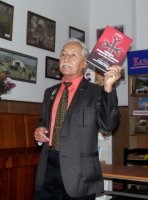Professor Akopov D.S., Academician of the International Academy of Literary Documentary
Professor Bondarenko I.I., President of the European Academy of Security and Conflictology,
President of the European Foundation of Slavic Literature and Culture
April 24 - Memorial Day
of victims of the Armenian genocide
Eternal memory of the people
 The history of Armenia knows many events that determined the fate of its people. One of the greatest tragedies of the 20th century is the genocide of the Armenian people in the Ottoman Empire. However, this indisputable fact has not yet received official recognition by Turkey.
The history of Armenia knows many events that determined the fate of its people. One of the greatest tragedies of the 20th century is the genocide of the Armenian people in the Ottoman Empire. However, this indisputable fact has not yet received official recognition by Turkey.
Meanwhile, genocide is an integral part of the ethnic code of the Armenian people. As the well-known Russian scientist-orientalist, professor Yevgeny Satanovsky justly notes: "If Armenia renounces the memory of the Armenian genocide, it will cease to be Armenia."
One of the indigenous and most ancient peoples was subjected to the most severe extermination in its own home, in its historical homeland. According to the American political scientist R. Rummel during the genocide of 1915-1923 2 million 102 thousand Armenians were killed, which dealt a fatal blow to the gene pool of the Armenian nation. The Anatolian civilization was wiped off the face of the earth.
Armenians lost 9/10 of their national territory, expelled from 66 cities and about 2500 villages. About 800 thousand of them became forced refugees. Earlier, even before the start of a large-scale atrocity, only in the period from 1894 to 1896, according to various estimates, from 300 to 400 thousand Armenians were massacred. Their only fault was their nationality. A consequence of the genocide that followed two decades later was the fact that the industrious and peaceful Armenian people lost the spiritual and cultural values accumulated over millennia, which had not only national but also world significance and were appropriated bytheTurkish state and its population. Tens of thousands of houses, 2,500 Christian churches, 1,500 schools and gymnasiums have been looted,  burned, and destroyed. The Armenians were deprived of their spiritual heritage. Priceless books, icons, khachkars were appropriated by the Turkish state and those who helped, inspired the performers to commit this grave atrocity.
burned, and destroyed. The Armenians were deprived of their spiritual heritage. Priceless books, icons, khachkars were appropriated by the Turkish state and those who helped, inspired the performers to commit this grave atrocity.
A whole nation received a terrible psychological trauma. He lost his living space, the opportunity to communicate with his native nature, national symbols, etc. The consequences of this trauma will be felt in centuries.
One of the most tragic pages is the deliberate and unjustified savage extermination of tens of thousands of Armenian children, their forcible Islamization. More then 150 thousand children became orphans. The rulers of the Ottoman Empire were well aware that by depriving the Armenians of the younger generation, they deprive the future of an entire people.
The implementation of the complete extermination of the Armenian people made it possible to solve another, extremely important for the Turkish nationalists, geopolitical task: clearing the road to Great Turan from the Armenians professing Christianity, and uniting all the Turkic peoples into one empire.
The genocide organized in the Ottoman Empire is a shameful page in world history. As the political scientist of the United States, Professor Todd Lefko, rightly notes, it is truly tragic that only a few leaders of the great countries raised their voices in condemning the murderers. For many others, the immediate benefits were stronger than the moral imperatives.
Germany, as a Turkey's ally in the First World War, also bears a certain legal, moral and political responsibility for the Armenian genocide. In fact, it was the German advisers who proposed to the Turks a plan to deport the Armenian population and build a new empire in an eastern direction, abandoning European territories. Germany's hostile attitude towards the Armenian people was primarily due to its Russophilia, its benevolent attitude towards its northern neighbor, Russia.
Bolshevik Russia also played a tragic role in the fate of the Armenian people at that time. With their foreign policy, decisions of the Moscow (March 1921), Karsky (October 1921) treaties, the Bolsheviks helped to reject the decisions of the Sevres (1920) treaty on the Armenian issue, both by the international community and the government of Armenia controlled by them. From the Bolsheviks, raving about the world revolution, blindly believing the Turkish "revolutionaries", Turkey received as a "gift" part of the Republic of Armenia - the Karsky region, other territories that were previously part of the Russian Empire.
The lack of proper and timely condemnation and punishment for the crime committed in many ways has given rise and still gives rise to its relapses. The Austrian writer Franz Werfel believed that the Holocaust perpetrated by the Nazis became the retribution of civilized Europe for not “noticing” the Armenian genocide at the beginning of the 20th century.
The problem of genocide is not a thing of the past and reminds of itself from time to time. These are the tragedies associated with the cultural revolution and the extermination of its own people in China in 1966-1976 and in Kampuchea during the reign of the "Red Khmers" in 1975 - 1979; genocide in Rwanda in 1994, when up to 1 million people from the Tutsi tribe were killed. The sad list is not limited to just listing these events.
The fact of the implementation of the Armenian Genocide by the Ottoman government is justified, recognized and confirmed by eyewitness accounts, archival documents, laws, resolutions and decisions of many countries and international organizations.
Armenians do not consider the Turkish people as their enemy. The problem is in restoring justice, in condemning the gravest crime that the Ottoman Empire committed.
The main obstacle on the way of eliminating the consequences of the Armenian Genocide remains today the position of Turkey, namely its unwillingness to condemn the dark pages of its history and repent for the atrocities committed by their ancestors.
The father of the Turkish nation Mustafa Kemal, speaking before the Supreme Tribunal of Istanbul on January 27, 1919, said, in particular, that "unprecedented and unimaginable crimes committed against the Armenian people are an unprecedented fact in the history of mankind" ... His words of condemnation resonate in modern Turkish society. More and more representatives of the intellectuals are turning to the topic of the first genocide of the twentieth century. Such names as Taner Akcam, Asli Aydıntasbas, Zulfü Livaneli and others are personified in modern Turkey with the recognition of the genocide of the Armenian people by the Ottoman Empire.
The position of the Armenian people is clearly expressed in the All-Armenian Declaration on the 100th anniversary of the Armenian Genocide. Clause 9 of this extremely important document for the future of the two peoples says on behalf of all Armenians that the Armenian people who have passed through the horrors of the genocide: "expresses the hope that the recognition and condemnation of the Armenian genocide by the Republic of Turkey will become an important starting point for the process of reconciliation of the Armenian and Turkish peoples."


